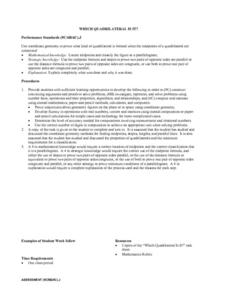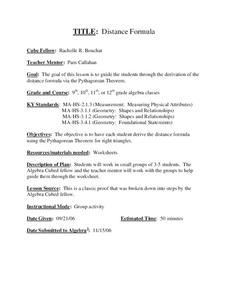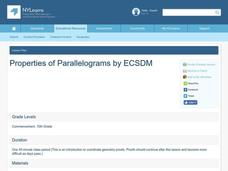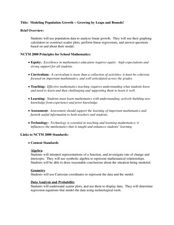EngageNY
How Do Dilations Map Segments?
Do you view proofs as an essential geometric skill? The resource builds on an understanding of dilations by proving the Dilation Theorem of Segments. Pupils learn to question and verify rather than make assumptions.
Curated OER
Points, Lines and Planes
In this points, lines and planes worksheet, 10th graders solve and complete 9 various types of problems. First, they name the planes that intersect a figure shown. Then, students determine the points that are collinear and coplanar in...
Curated OER
Tessellations: Geometry and Symmetry
Learners explore the concept of tessellations. In this tessellations instructional activity, students use an applet to construct tessellations. Learners use regular polygons to construct tessellations. Students find patterns and symmetry...
Curated OER
Challenge: Skills and Applications Lesson 1.3
In this skills worksheet, students explain the Segment Addition Postulate, provide examples and counter examples and determine congruent line segments. This one-page worksheet contains 11 multi-step problems.
EngageNY
Applications of the Pythagorean Theorem
Examine the application of the Pythagorean Theorem in problem-solving questions. Pupils apply the theorem to find lengths when given different scenarios. They finish the 17th installment in an 18-part series by applying the theorem to...
Curated OER
Special Segments in a Triangle
In this geometry worksheet, 10th graders review the vocabulary associated with the special segments of a triangle and the associated points of concurrency and solve problems in which they find the indicated missing angle or segment. The...
Curated OER
Profitable Soda Stand
Am I making any money? Help learners determine if their fictitious soda stand is turning a profit. They graph linear equations using the slope and y-intercept and identify the best price to use to sell soda. They identify the domain and...
Curated OER
Which Quadrilateral Is It?
High schoolers prove conjectures about geometric figures on the plane or in space using coordinate geometry. They develop fluency in operations with real numbers, vectors and matrices using mental computation or paper-and-pencil...
Curated OER
Distance Formula
Students calculate the distance between two points using the distance formula. In this geometry lesson plan, students derive the distance formula using the Pythagorean Theorem.
Curated OER
Parallel and Perpendicular Lines
Tenth graders explore parallel and perpendicular lines. In this geometry lesson, 10th graders investigate the relationships associated with parallel lines and transversals, perpendicular lines, and the angles formed by these lines. ...
Curated OER
Properties of Parallelograms
Students identify different properties of parallelograms. In this geometry lesson, students complete problems that proves the theorems and properties of parallelograms. They graph the different shapes on paper.
Curated OER
Midpoint
In this geometry worksheet, 10th graders use the concept of midpoint of a line segment to solve problems in which they determine the length of the indicated segments. The one page worksheet contains twelve problems, including a...
Virginia Department of Education
Similar Triangles
Pupils work in pairs to investigate what it takes to prove that two triangles are similar. They work through various shortcuts to find which are enough to show a similarity relationship between the triangles. Small groups work with the...
Mathematics Assessment Project
Square
Don't be a square! Young mathematicians determine the slope and length of a line segment. They then prove whether four given coordinate points form a square.
Curated OER
Iterating Linear Functions
Students use a spreadsheet to investigate data. In this algebra instructional activity, students collect and graph data on a coordinate plane. They explain properties of a linear equation both algebraically and orally.
Curated OER
Got Complements? with Cabri Jr.
Learners use the axes and measure angle tool to explore and calculate complementary angles with Cabri Jr. They also identify what happens to the calculation as they drag the endpoint into a different quadrant. Finally, they label each...
Radford University
Parallel Lines, Transversals, and Angles: What’s the Connection?
Streets, bridges, and intersections, oh my! Parallel lines and transversals are a present in the world around us. Learners begin by discovering the relationship of the angles formed by parallel lines and a transversal. They then apply...
Virginia Department of Education
Lines and Angles
Explore angle relationships associated with transversals. Pupils construct parallel lines with a transversal and find the measures of the angles formed. They figure out how the different angles are related before constructing...
Curated OER
Interactivate - Lines, Rays, Line Segments, and Planes
Students explore lines, rays, line segments, and planes. For this math lesson, students discuss the math concepts and direct their instructor in graphing functions. Students collaborate in graphing additional functions.
Curated OER
Picking Pythagoras
Students discover that side measurement is used in determining angle classification of a triangle. By squaring sides, they predict whether triangles be right, obtuse, or acute. They prove the Pythagorean Theorem and use it to solve...
Curated OER
Fractals and the Chaos Game
Students explore the concept of fractals. In this fractals lesson, students play the "Chaos Game" via an applet. Students place dots on the screen to recognize that they have created Sierpinski's Triangle.
Curated OER
The Mandelbrot Set
Students explore the concept of Mandelbrot sets and Julia sets. In this Mandelbrot and Julia set instructional activity, students use a function integrator applet to investigate two-variable function iterations. Students use Julia set...
Curated OER
Modeling Population Growth
Students collect data on population growth. In this statistics activity, students graph their data and make predictions. They find the linear regression and the best fit line.
Pennsylvania Department of Education
Creating Polygons
Students describe, make and compare polygons. In this creating polygons lesson, students identify properties of quadrilaterals and describe common features of two dimensional shapes.

























